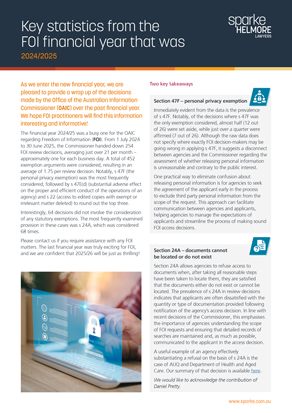Key statistics from the FOI financial year that was – 2024/25
30 July 2025
As we enter the new financial year, we are pleased to provide a wrap up of the decisions made by the Office of the Australian Information Commissioner (OAIC) over the past financial year. We hope FOI practitioners will find this information interesting and informative!
The financial year 2024/25 was a busy one for the OAIC regarding Freedom of Information (FOI). From 1 July 2024 to 30 June 2025, the Commissioner handed down 254 FOI review decisions, averaging just over 21 per month – approximately one for each business day. A total of 452 exemption arguments were considered, resulting in an average of 1.75 per review decision. Notably, s 47F (the personal privacy exemption) was the most frequently considered, followed by s 47E(d) (substantial adverse effect on the proper and efficient conduct of the operations of an agency) and s 22 (access to edited copies with exempt or irrelevant matter deleted) to round out the top three.
Interestingly, 64 decisions did not involve the consideration of any statutory exemptions. The most frequently examined provision in these cases was s 24A, which was considered 68 times.
Please contact us if you require assistance with any FOI matters. The last financial year was truly exciting for FOI, and we are confident that 2025/26 will be just as thrilling!
Two key takeaways
Section 47F – personal privacy exemption
Immediately evident from the data is the prevalence of s 47F. Notably, of the decisions where s 47F was the only exemption considered, almost half (12 out of 26) were set aside, while just over a quarter were affirmed (7 out of 26). Although the raw data does not specify where exactly FOI decision-makers may be going wrong in applying s 47F, it suggests a disconnect between agencies and the Commissioner regarding the assessment of whether releasing personal information is unreasonable and contrary to the public interest.
One practical way to eliminate confusion about releasing personal information is for agencies to seek the agreement of the applicant early in the process to exclude third party personal information from the scope of the request. This approach can facilitate communication between agencies and applicants, helping agencies to manage the expectations of applicants and streamline the process of making sound FOI access decisions.
Section 24A – documents cannot be located or do not exist
Section 24A allows agencies to refuse access to documents when, after taking all reasonable steps to locate them, they are satisfied that the documents either do not exist or cannot be located. The prevalence of s 24A in review decisions indicates that applicants are often dissatisfied with the quantity or type of documentation provided following notification of the agency’s access decision. In line with recent decisions of the Commissioner, this emphasises the importance of agencies understanding the scope of FOI requests and ensuring that detailed records of searches are maintained and, as much as possible, communicated to the applicant in the access decision.
A useful example of an agency effectively substantiating a refusal on the basis of s 24A is the case of AUQ and Department of Health and Aged Care. Our summary of that decision is available here.
View our 2024/2025 FOI year in review
Our review contains a table highlighting all the decisions made in the 2024/2025 financial year, including hyperlinks to the decision on the Australasian Legal Information Institute site.




